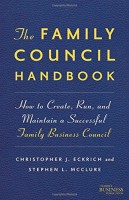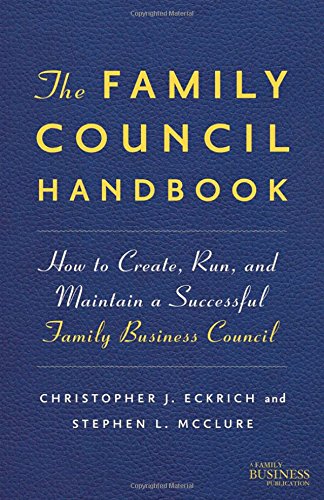 Authors: Christopher J. Eckrich and Stephen L. McClure
Authors: Christopher J. Eckrich and Stephen L. McClure
Publisher: Palgrave Macmillan – 370 pages
Book Review by: Laxmi Chaandi
Some families that own businesses get along nicely, while others not so smoothly, and still others have constant conflicts. There are many factors that govern such relationships. Cultural backgrounds, sizes of families with respect to the number of members and generations, expectations and goals, ownership percentages, and personality types are just a few of these determining factors.
Having peace and harmony in a family, even in one that does not own a business, can sometimes be tough. And running a business, even a publicly-owned one, can also be challenging. So managing and growing a family-owned business can be doubly difficult.
This book was written to guide the members of families that own businesses how to achieve success, growth and longevity in their business, as well as to keep family members happy and productive. The book can also help you deepen family bonds which in turn can help you strengthen the business. We cannot emphasize the importance of the adage “in unity there is strength.”
The authors have experience and insight in organizing and maintaining family councils that help run businesses successfully. In this book, Christopher Eckrich and Stephen McClure lay out and discuss the many advantages of a family council as a means of smoothly running a family business. They cover the who, what, when, where, how, and why of a family council.
To give you an overview of what you will (and will not) find in this book, I have enumerated its 14 chapters below.
- Family Organization and Governance for Sustaining the Family Business: A Field Manual
- Reasons for Starting and Resisting a Family Council
- Stages of Family Businesses and Types of Family Councils
- How to Start and Organize a Family Council
- Running the Family Council
- Committees of the Family Council
- The Family Assembly and the Family Association
- Special Family Governance Structures: Owners Councils and Executive Committees
- Family Leadership
- Using a Professional Facilitator
- Transitions in the Family Council
- Connecting the Family Council with the Board and the Business
- Family Communications
- The Journey Forward
Here are some of the questions to which you may or may not have answers. The book provides answers to these questions.
- What is the one important element family businesses have, that public companies do not?
- What were some of the advantages of regular family business meetings that were found in a study of 614 family businesses?. Use your common sense to guess some answers.
- How do you find a solution to the problem of continuity when none of your children want to take over the business?
- What are some reasons family members resist organizing a family council, and how do you overcome the various objections?
- What are some of the areas that should be covered in the “instruction manual” or charter on running an effective family business council?
- What are some of the committees that should be created within the family business council? What should they do to help delegate the different tasks of a family council?
- What are the purposes of the Family Assembly? What about the Family Association?
This book is an excellent resource to proactively avoid conflict and confusion in family businesses. It can help you promote peace, harmony, success, growth, continuity, longevity of your business, and create prosperity for the members of the family. Get it.
Christopher J. Eckrich, PhD is a principal of the Family Business Consulting Group, Inc. and specializes in aligning shareholder groups, building leadership excellence, and maintaining family unity in multi-generational enterprising families. He is an adjunct professor at the University of Notre Dame.
Stephen L. McClure is a principal of the Family Business Consulting Group, Inc. and specializes in family communications and decision making, succession planning and implementation, and governance and management in family firms.







